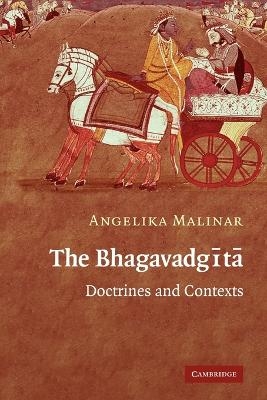
The Bhagavadgita
Doctrines and Contexts
Seiten
2009
Cambridge University Press (Verlag)
978-0-521-12211-5 (ISBN)
Cambridge University Press (Verlag)
978-0-521-12211-5 (ISBN)
The Indian Mahabharata epic includes one of the most important texts of Hinduism: the Bhagavadgita. Angelika Malinar analyses the doctrines of the text in a chapter-by-chapter discussion. She also considers its historical and cultural contexts and the features that became paradigmatic in later Hindu religious traditions.
The Bhagavadgita is one of the most renowned texts of Hinduism because it contains discussions of important issues such as liberation and the nature of action as well as the revelation of the Krishna as the highest god and creator of the universe. It is included in the ancient Indian Mahabharata epic at one of its most dramatic moments, that is, when the final battle is about to begin. In contrast to many other studies, this book deals with the relationship between the Bhagavadgita and its epic contexts. On the basis of a thorough analysis of the text Angelika Malinar argues that its theology delineates not only new philosophical concepts and religious practices but also addresses the problem of righteous kingship and appropriate use of power. Malinar concludes by considering the Bhagavadgita's historical and cultural contexts and those features of the text that became paradigmatic in later Hindu religious traditions.
The Bhagavadgita is one of the most renowned texts of Hinduism because it contains discussions of important issues such as liberation and the nature of action as well as the revelation of the Krishna as the highest god and creator of the universe. It is included in the ancient Indian Mahabharata epic at one of its most dramatic moments, that is, when the final battle is about to begin. In contrast to many other studies, this book deals with the relationship between the Bhagavadgita and its epic contexts. On the basis of a thorough analysis of the text Angelika Malinar argues that its theology delineates not only new philosophical concepts and religious practices but also addresses the problem of righteous kingship and appropriate use of power. Malinar concludes by considering the Bhagavadgita's historical and cultural contexts and those features of the text that became paradigmatic in later Hindu religious traditions.
Angelika Malinar teaches in the Department of Study of Religions at the School of Oriental and African Studies, University of London.
1. Introduction; 2. Debates over war and peace in the Udyogaparvan of the Mahabharata; 3. The doctrines of the Bhagavadgita; 4. The doctrines of the Bhagavadgita: summary and systematic considerations; 5. Historical and cultural contexts.
| Erscheint lt. Verlag | 29.10.2009 |
|---|---|
| Zusatzinfo | Worked examples or Exercises |
| Verlagsort | Cambridge |
| Sprache | englisch |
| Maße | 152 x 229 mm |
| Gewicht | 460 g |
| Themenwelt | Geisteswissenschaften ► Geschichte ► Regional- / Ländergeschichte |
| Geisteswissenschaften ► Philosophie | |
| Geisteswissenschaften ► Religion / Theologie ► Buddhismus | |
| Geisteswissenschaften ► Religion / Theologie ► Hinduismus | |
| ISBN-10 | 0-521-12211-2 / 0521122112 |
| ISBN-13 | 978-0-521-12211-5 / 9780521122115 |
| Zustand | Neuware |
| Haben Sie eine Frage zum Produkt? |
Mehr entdecken
aus dem Bereich
aus dem Bereich
Erinnerungen
Buch | Softcover (2024)
Pantheon (Verlag)
16,00 €
Universalgelehrter, Polarreisender, Entdecker
Buch | Hardcover (2024)
mareverlag
28,00 €


